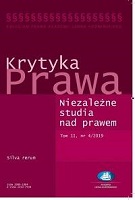The Presumption of Common Language as an Interpretive Paradigm and Its Opponents in Polish Legal Theory
The Presumption of Common Language as an Interpretive Paradigm and Its Opponents in Polish Legal Theory
Author(s): Zbigniew PulkaSubject(s): Language acquisition, Sociolinguistics, Theory of Communication, Sociology of Law, Stylistics
Published by: Akademia Leona Koźmińskiego
Keywords: Interpretation; presumption of common language; linguistic competence; interpretative paradigm; law text;
Summary/Abstract: In my paper, I reconstruct Jerzy Wróblewski’s theory of interpretation. My goal is to show that this theory has the characteristics of a paradigmatic theory because of the importance of the presumption of common language, which is a fundamental element of this theory. This presumption is decisive in shaping the picture of interpretation and, consequently, gives the theory in question the status of a model theory defining a postulated model of legal interpretation. In the paper, I discuss various aspects of this presumption, highlighting its importance in preserving the principle of universal access to practical (legal) discourse. At the same time, I question the views that challenge this presumption by claiming that the language of law is a code accessible only to a cognitively privileged group of professional lawyers.
Journal: Krytyka Prawa
- Issue Year: 15/2023
- Issue No: 2
- Page Range: 331-350
- Page Count: 20
- Language: English

